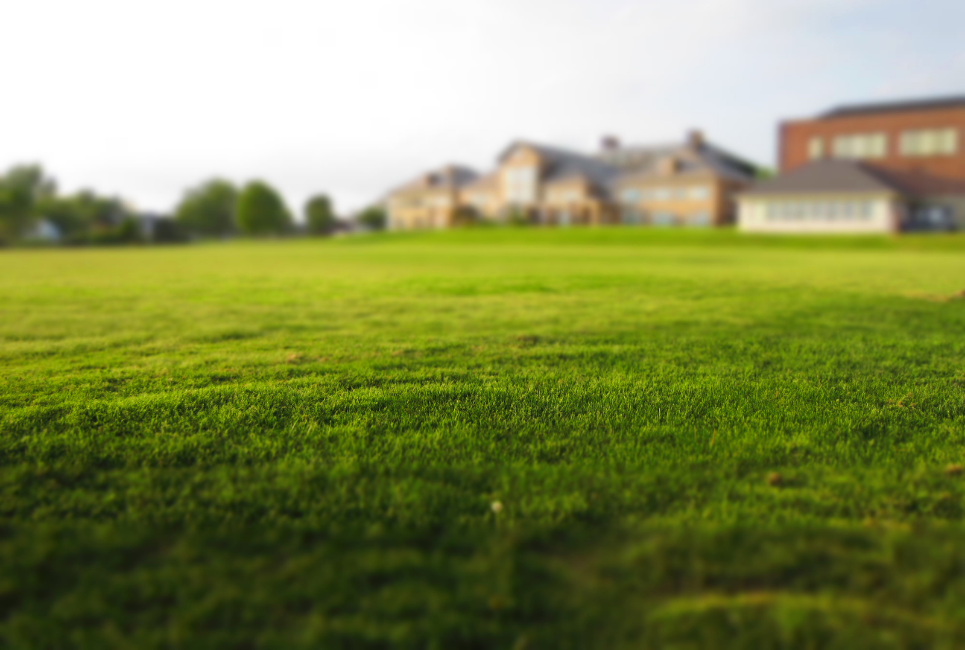- Bermuda vs St Augustine Grass: Which Is Right For You? - March 15, 2021
- How to Fix Yellow Grass: Top Tricks and Ideas You Must Know - March 14, 2021
- Best Soil Test Kits – 7 Top Picks to Get the Job Done - December 16, 2020
Upon hearing the name Cynodon dactylon, you might be reminded of dinosaurs. But it’s the scientific name of Bermuda grass.
Most gardeners like growing Bermuda grass. It’s very low maintenance as it can survive extended periods of drought. With little to no watering, Bermuda grass stays green. Plus, it can withstand heavy foot traffic, and even when stressed, this type of grass bounces back quickly.
If you’re looking to grow this warm-season grass, here are the seeds that you should consider buying:
- Scotts Turf Builder Grass Seed Bermuda Grass
- Pennington Seed Bermuda Grass Seed
- Nature’s Seed Bermuda Grass Blend
- Farmers Daughters Seeds HULLED Coated Bermuda Grass
- Princess 77 Hybrid Bermuda Grass Seeds
- Scotts EZ Seed Patch and Repair Bermuda Grass
What are the things you need to know about Bermuda grass? We will look into what Bermuda grass is, the best seeds that you can get today, as well as the answers to some of the most asked questions when it comes to Bermuda grass seeds.
Characteristics of Bermuda Grass
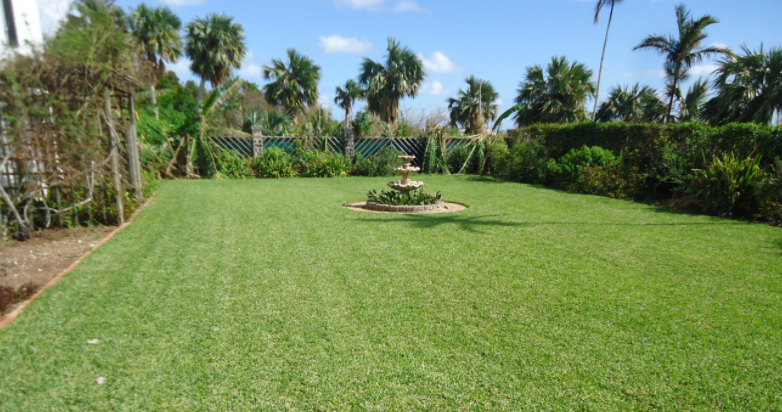
Bermuda grass is short, with blades that usually measure around 0.8 to 5.9 inches (two to 15 centimeters). It has rough edges and a grayish-green color.
Bermuda grass is hardy in warmer climates because of its deep network of roots that can grow up to 6.6 feet (two meters) deep into the ground. Their stolons and rhizomes spread the roots. It can develop roots when its nodes touch the soil.
As such, Bermuda grass can be very dense. This grass grows when temperatures reach 59 degrees Fahrenheit (15 degrees Celsius). However, Bermuda grass grows better in warmer temperatures of around 75 to 99 degrees Fahrenheit (24 to 37 degrees Celsius).
As temperatures fall, Bermuda grass turns brown as it spends winter in dormancy.
Bermuda Grass Characteristics at a Glance
- Good winter hardiness
- Excellent heat and drought tolerance
- Poor shade tolerance
- Ideal for soil with pH 5.8 to 7.0
- Moderate to a high maintenance level
- Medium to dark green color
- Medium to a fine leaf texture
- Excellent wear tolerance and recuperative capacity
- Can be established from seeds, sods, plugs, or sprigs
- Fast-growing
- Develops rhizomes and stolons
The Best Bermuda Grass Seeds That You Can Buy Right Now
Now that you know the different characteristics of Bermuda grass, you now have an idea of whether it’s the right grass for your lawn.
Obviously, if you live in colder climates, Bermuda grass is not for you. And if you’re looking for something that will be easy to maintain, then you should know that centipede grass and St. Augustine grass are much easier to care for than Bermuda grass.
If you think Bermuda grass is the right choice for you, then here are the best Bermuda grass seeds that you can buy:
1. Scotts Turf Builder Grass Seed Bermuda Grass
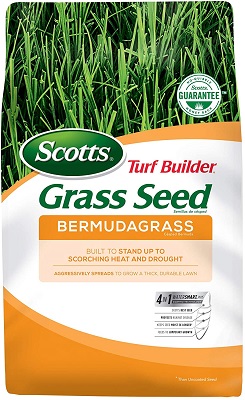
The Scotts Turf Builder Grass Seed Bermuda Grass is perfect for lawns that get full sun and lots of foot traffic. Bermuda grass is drought-resistant. This product comes with a WaterSmart PLUS coating that lets the seed absorb more water and get more nutrients. All that means that there is no pressure for you to water too much.
These seeds can aggressively spread, quickly covering brown areas and bare spots. It can also crowd out and suffocate weeds. It comes in three different sizes:
- A one-pound (0.45 kilograms) bag with enough seeds to cover 1,000 square feet (92.9 square meters) of space
- Five pounds (2.3 kilograms) to cover 5,000 square feet (464.5 square meters)
- 10 pounds (4.5 kilograms) to cover 10,000 square feet (929 square meters)
Pros
- Perfect for lawns that have a longer period of drought and heat
- Low maintenance
- WaterSmart PLUS coating helps keep seeds moist
- Affordable
Cons
- Some reviewers complain about the low germination rates of the seeds, with quite a few complaining that the seeds didn’t grow
2. Pennington Seed Bermuda Grass Seed
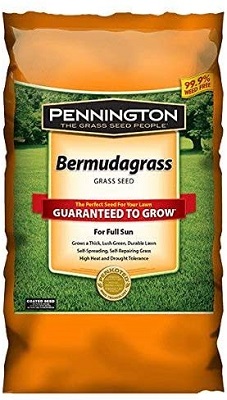
The Pennington Seed Bermuda Grass Seed gives you 15 pounds (6.8 kilograms) of Bermuda grass seed. It’s perfect for sunny lawns where you want a fine turf texture.
The blades on the grass that grow from these are very thin, but it is very durable even with heavy foot traffic.
Pros
- Easy to sow with a spreader
- One of the most affordable products on this list
Cons
- A few customers reported that only a tiny portion of the seeds grew, or none at all
3. Nature’s Seed Bermuda Grass Blend
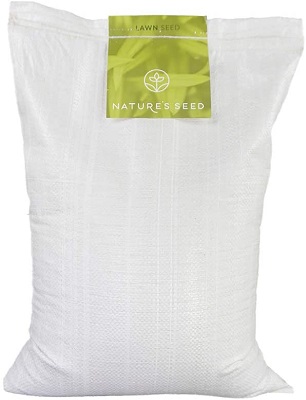
The Nature’s Seed Bermuda Grass Blend gives you pure live seeds for your lawns. Unlike other products, they don’t use fillers and you get a bag that is 98 percent made up of seeds.
What’s more, this product contains three premium-grade grass seeds, and the blend is perfect for warmer climates.
Pros
- It comes in cloth bags that you can reuse and is biodegradable
- You get 98 percent pure seeds, so you’re not paying for anything else
- Results in rich green lawns
Cons
- Some reviewers complain that the seeds never grow
- More expensive than other products on this list
4. Farmers Daughters Seeds HULLED Coated Bermuda Grass

The Farmers Daughters Seeds HULLED Coated Bermuda Grass gives you five pounds (2.3 kilograms) of Bermuda grass seeds. This bag has enough seeds to cover a space measuring more than 1,000 square feet (92.9 square meters).
These are perfect for warmer climates and can thrive in any type of soil from sandy to clay.
Pros
- Seed sprouts faster than comparable products
- Value for money
5. Scotts EZ Seed Patch and Repair Bermuda Grass
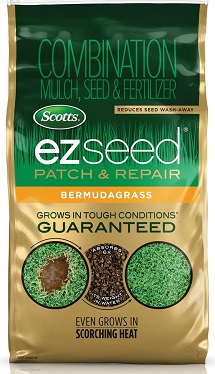
There are times when certain patches of grass on your lawn die or turn brown. Other times, you can find small bare areas that need repair. This situation is where the Scotts EZ Seed Patch and Repair Bermuda Grass shines.
This product has everything you need to make every nook and cranny of your lawn green. It has Bermuda grass seeds that the manufacturer guarantees will grow. It also has a controlled release fertilizer that can help your seeds sprout, as well as mulch that can retain up to six times its weight in water. The mulch helps keep the seeds moist.
Further, the bag contains tackifiers that will help the seeds stay in place and not be washed away, while the protectant keeps diseases and pests away. The Scotts EZ Seed Patch and Repair Bermuda Grass has seeds that can grow even in sweltering climates, high foot traffic areas, and uneven ground.
Pros
- Works as advertised
- The cheapest product on this list
Cons
- A few reviewers reported that the seeds did not grow or did not grow as much as they’d like
6. Princess 77 Hybrid Bermuda Grass Seeds
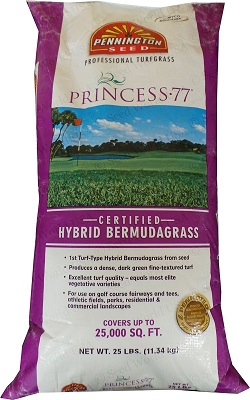
The Princess 77 Hybrid Bermuda Grass Seeds gives you dark green turf. The blades of this Bermuda grass take on a dark green hue and have a medium to fine leaf texture. This hybrid comes from two cross fertile parents instead of coming from the same mother plant.
Pros
- Grows quite well, with some customers saying that these seeds grow in just a matter of four days
Cons
- Has fillers that take up half of the promised volume
Maintenance
Grass needs to be mowed, watered and fertilized so that it can grow healthy and thick. If you’re the busy type, you might want a low maintenance grass such as centipede or Zoysia grass. Bermuda grass, as well as St. Augustine and tall fescue, needs some amount of work.
However, the Kentucky bluegrass might need more of your time as it is very high maintenance.
Characteristics of Some of the More Common Grasses: A Side-by-Side Comparison
We’ve collated the characteristics of some of the most popular grasses being used as turf today. This table should make it easier for you to determine if Bermuda grass is the best for you or if other types would be more ideal.
| Type | Bermuda Grass | Centipede Grass | St. Augustine Grass | Kentucky Bluegrass | Tall Fescue | Zoysia Grass |
| Winter hardiness | Good | Fair | Poor | Excellent | Excellent | Very good |
| Heat tolerance | Excellent | Excellent | Excellent | Fair | Good | Excellent |
| Drought tolerance | Excellent | Good | Fair | Poor | Fair | Very good |
| Shade tolerance | Poor | Fair | Good | Good | Good | Fair |
| Optimum soil pH | 5.8 to 7.0 | 4.5 to 6.0 | 6.5 to 8.0 | 5.8 to 7.0 | 5.5 to 6.5 | 5.8 to 7.0 |
| Maintenance level | Moderate to high | Low | Moderate | High | Moderate to high | Low to moderate |
| Color | Medium to dark | Pale green | Medium to dark green | Medium to dark green | Medium to dark green | Pale to medium green |
| Leaf texture | Medium to fine | Coarse | Coarse | Medium | Coarse | Medium to fine |
| Wear tolerance | Excellent | Poor | Poor | Good | Good | Excellent |
| Recuperative capacity | Excellent | Poor | Good | Good | Poor | Good |
| Growth rate | Fast | Slow | Moderate to fast | Slow | Moderate | Slow |
| Stolons | Yes | Yes | Yes | No | No | Yes |
| Rhizomes | Yes | No | No | Yes | No | Yes |
| Bunching type? | No | No | No | No | Yes | No |
FAQs
Answer: You should consider many factors when deciding on the type of grass you want to grow on your lawn, including region, season, geography, and maintenance level.
Bermuda grass is a warm-season grass, which means that they grow well in summer’s hot days. They are also not hardy for winter. Warm-season grasses start thriving in the middle of spring, all throughout the summer, and sometimes well into autumn. They go dormant and become brown in the winter months.
As a warm-season grass, Bermuda grass is very tolerant to drought. You can go for days without watering Bermuda grass, and it will still grow lush.
Other characteristics of Bermuda grass you should know:
• Fine to medium texture
• Can survive an area where there is medium level foot traffic
• Requires full sunlight
• Can proliferate and fill in the bare spots dotting your lawn
Answer: When you’re on the market for Bermuda grass, you will come across products that are labeled as seed mixtures, blended seed mixtures, and lawn repair mix. Seed mixtures will include Bermuda grass seeds as well as seeds of other kinds of grasses. The idea is to grow a variety of grass on your lawn so that it will be green and healthy all year round.
Blended seed mixtures have seeds from the same grass species. The grass will look the same, but you can rely on each variety’s strengths to make sure that your lawn is healthy.
Lawn repair mixes have mulch and fertilizers along with the seeds. You can solve problems with your lawn such as having brown patches of grass or bald spots just by using this mix. And you don’t have to worry about the proportions.
Answer: Your location, region, and the amount of work you want to put into growing your law will all play a factor in the type of grass seeds that you sow on your lawn. Bermuda grass certainly has a good set of characteristics that allows it to be a better choice than most turf grasses. It is tolerant of extreme heat and drought, with some degree of winter hardiness.
However, Bermuda grass doesn’t grow well in the shade, so if your lawn has a lot of shady areas, then you might want to look at tall fescue, St. Augustine grass, or Kentucky bluegrass.
If you don’t have a balanced soil pH, you might want to consider other grass types as well. Alkaline soil has a pH of at least 7.0, and acidic soil has a pH of less than 7.0. If you have acidic soil, then you might want to give centipede grass a try. On the other hand, if you have alkaline soil, then St. Augustine grass might be a better choice.
Green Lawns Are Easy with the Best Bermuda Grass Seeds
Once you know for sure that Bermuda grass will grow in your region, you can choose from the products that we know are the best seeds available out there. There are instructions on the seed packaging to learn how to plant these seeds so that it successfully sprouts and grows.
Check out how Bermuda compares to:

